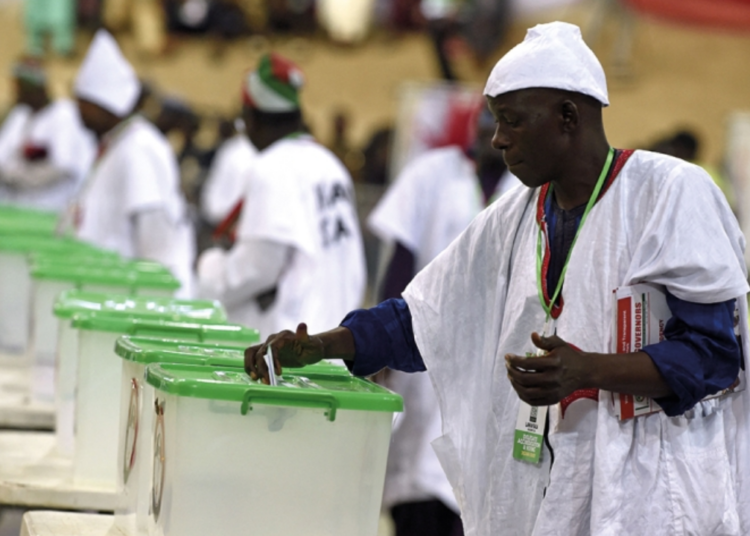During the just concluded off-cycle governorship election in Beyelsa, Kogi and Imo states, former President of Nigeria, Goodluck Jonathan, made an appeal to the National Assembly to further amend the 1999 constitution to bring an end to off season elections. The former president, while voting in Otuoke, Ogbia Local Government Area of Bayelsa State, described the exercise as not in line with global best practices.
Jonathan did not elaborate on the misgivings he had about off-cycle election, but we share his concerns that the election is distorting Nigeria’s march towards a stable and organized electoral process just as they are also sowing chaos in the political landscape of states involved.
The most Jonathan said was, “Let me congratulate the three states that had election today; Bayelsa, Imo and Kogi States. But basically, because this is an off-season election, I get worried about the issue of off-season election. I’ll use this unique opportunity to plead with the National Assembly that we need to block this off-season election.”
We recall that back in 2010, Jonathan as president had the opportunity to make some of these changes considering he had a good working relationship with then Senate President David Mark. The most they were able to achieve in the 2010 Electoral Act then, was to add one more layer of bureaucracy in the process of determining the petition on governorship elections with the Supreme Court becoming the final decider.
Today, governorship election in eight states do not hold during general election. In Anambra, the last election for governor was held on November 6, 2021. Ekiti on June 18, 2022, while Osun had its election on July 16 of the same year. Apart from the November 11 election held in Kogi, Imo and Bayelsa, a few weeks ago, elections are expected to hold in Edo on September 21, 2024 and in Ondo on November 16 2024.
Should the Supreme Court, for any reason, annul any of the 28 governorship elections that were held during this year’s general election, then the number of states holding off-cycle election will increase. And at this rate, it is only a matter of time before a majority of states will hold elections off season. Already, the Court of Appeal has annulled the governorship elections in Kano, Zamfara and Plateau. It remains to be seen how the Supreme Court will rule in those petitions.
It is easy to see how an election annulment can remove any state from the general election cycle. Using Anambra as an example, Peter Obi who contested for governor back in 2003 under the All-Progressives Grand Alliance (APGA) was said to have lost to Chris Ngige of the People’s Democratic Party (PDP). But three whole years later, in 2006; the Supreme Court declared Obi winner of the election and his mandate was for a four-year term.
Since then, some changes have been made in the constitution and the Electoral Act. But the time frame for determining election petitions still encroaches on the date of swearing-in, and subsequently into the day the mandate of whoever the courts determined as the actual winner. According to the 2023 Electoral Act, a tribunal should be constituted not later than 14 days before the election; and when constituted, open their registries for business not later than 30 days after the election. The law also says that an election petition should be filed within 21 days after the date of the declaration of result of the election. The Tribunal also has to deliver a judgment in writing within 180 days from the date of the filing of the petition and it gives to Court of Appeal another 60 days to come to a decision.
Section 138 (1) and (2) of the 2023 Electoral Act reads: Where the election is nullified by the Court and notice of appeal against the decision is given within the stipulated period for appeal, the elected candidate shall, notwithstanding the contrary decision of the Court, remain in office and enjoy all the benefits that accrue to the office pending the determination of the appeal and shall not be sanctioned for the benefits derived while in office.
It goes on to say, If the Election Tribunal or the Court, as the case maybe, determines that a candidate returned as elected was not validly elected, the candidate returned as elected shall, notwithstanding the contrary decision of the Election Tribunal or the Court, remain in office pending the expiration of the period of 21 days within which an appeal may be brought.
In the opinion of this newspaper, the easiest way of stopping more governorship elections from falling into the category of states where elections are held off- season, is for the law to be amended to dispense with all election related petitions before the date of swearing-in. And in the eight states where election is already being held off- season, there are creative ways for the National Assembly to bring them back to the same electoral cycle with the rest of the country.
In our opinion, Jonathan has only suggested making constitutional amendments without putting across what those entails. The truth is that it cannot be possible without creating transition periods that will come into effect after the eight-year tenure of any given governor comes to an end.
We, however, acknowledge that making these changes will have a greater impact on how presidential election is litigated and its eventual outcome. With very weak institutions, it is a tall order to expect members of the Supreme Court or any other branch of the judiciary to annul the election of a president after he has already been sworn into office. To strengthen our democratic experience, it is our view that the laws must also be strengthened to address the reality of Nigeria’s electoral challenges.




